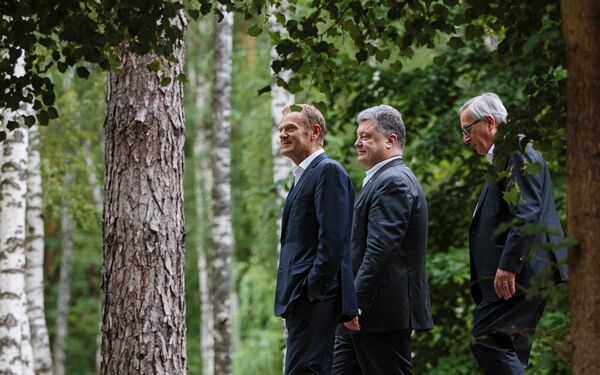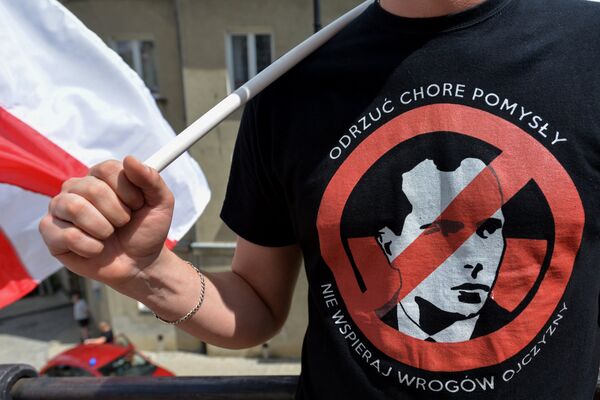The latest Russia-related scandal in Poland centers around a recent tweet by Tusk, in which the politician suggests that the ruling Law and Justice government's policies looks less like a patriotic leadership strategy and more like "the Kremlin's plan."
Alarm! Ostry spór z Ukrainą, izolacja w Unii Europejskiej, odejście od rządów prawa i niezawiłości sądów, atak na sektor pozarządowy i wolne media — strategia PiS czy plan Kremla? Zbyt podobne, by spać spokojnie.
— Donald Tusk (@donaldtusk) 19 ноября 2017 г.
"Alarm! Vehement dispute with Ukraine, isolation in the European Union, departure from the rule of law and independent courts, attack on NGOs and the free media – is this a Law & Justice Party strategy or the Kremlin's plan? They're too similar to rest easy."
The tweet sparked outrage among supporters of the country's conservative government, who have countered by suggesting that Tusk himself should be tried and imprisoned for alleged secret dealings with Russia during his tenure as the country's prime minister between 2007 and 2014.
Russian observers aren't surprised by the latest outpouring of anti-Russian paranoia in Polish politics. European politics analyst and RIA Novosti contributor Igor Gashkov jested that "in case of disagreement, Polish elites regularly denounce each other for working for the Kremlin," regardless of how absurd this may look to outside observers. This makes sense, the analyst added, given that Poland, "both during Tusk's term and after it, conducts the most anti-Russian policy in the whole of Eastern Europe."
What's Behind the Latest Back and Forth 'Working for the Kremlin' Jabs?
As Tusk alluded to in his tweet, his concerns about the current government include Warsaw's growing diplomatic row with neighboring Ukraine. During his term as prime minister, Tusk and his foreign minister Radowslaw Sikorski were key proponents of the EU's Eastern Partnership program, pushing Brussels to sign association agreements with former Soviet states including Ukraine, Moldova and Belarus, as well as the Caucasus republics. Sikorski actively supported the Maidan protests, which culminated in the overthrow of the Ukrainian government in February 2014. The new government in Kiev solidified Ukraine's pro-European orientation, serving as an important victory for Warsaw, Sikorski and Tusk.

However, following the dual election victories of the conservative national Law and Justice Party (PiS) in Polish presidential and parliamentary elections in 2015, relations between Warsaw and Kiev gradually began to take a turn for the worse, particularly as Kiev started a campaign to glorify Ukrainian fascist collaborators who took part in the killing of tens of thousands of Polish civilians in western Ukraine during World War II.
The simmering spat between Warsaw and Kiev escalated Friday after Poland barred a Ukrainian official from entering the country, in connection with Ukraine's continued refusal to exhume Polish civilians who were killed during the war by collaborationist forces. Kiev's proposal to do away with minority language schools has also sparked concerns in Poland, as well as other European countries, including Hungary and Romania.

Tusk's other concerns, centering around what he refers to as Warsaw's "isolation in the European Union," are based on the soft Eurosceptic PiS government's efforts to improve relations with Washington, Poland's other major partner, at the expense of Brussels and Berlin. The government's refusal to accept Middle Eastern migrants, as well as new laws on media and the courts, all of which the EU has slammed as 'incompatible with European values', are also undoubtedly part of Euro-integrationist Tusk's qualm with Warsaw.
For years, conservative forces, including officials in the current government, have accused Tusk of everything from shady contacts with Russian intelligence, to illegal dealings with Russian companies on the repair of the presidential planes, and even to bending to Moscow's will to prevent a real investigation from taking place. And while no actual evidence to back up these claims has been presented, these same forces have continued making them, even long after Tusk left Poland for a career in Brussels.
Kremla, powiadasz pan… pic.twitter.com/LBkIB2sjhu
— Eric Dale ن (@Eric1Dale) 19 ноября 2017 г.
"Kremlin, you say…"
Speaking to RIA Novosti, Petr Iskenderov, a senior researcher at the Moscow-based Institute of Slavic Studies, said that despite the latest spate of mutual recriminations for being 'Kremlin agents' or playing to 'Kremlin plans', neither of Poland's two major political factions can really be considered 'pro-Russian'.
"In Poland today, it's very convenient to simply blame your opponents for having ties with Moscow. This is just using a popular trend for political purposes. In reality, of course, there is nothing to back up such claims, no facts, just a political battle between Poles," the observer said.
As for which side can be said to be more anti-Russian, Iskenderov suggested that if he had to choose, he'd have to say Tusk.
"The European Council President is not only a proponent of the sanctions war against Moscow, or someone looking to torpedo energy projects such as Nord Stream 2, but also shows solidarity with Ukraine, which Warsaw is no longer willing to do unconditionally. So even though there is no pro-Russian vector in Polish politics, individual points of contact are possible [with the ruling government]; for Tusk, even that isn't possible."



